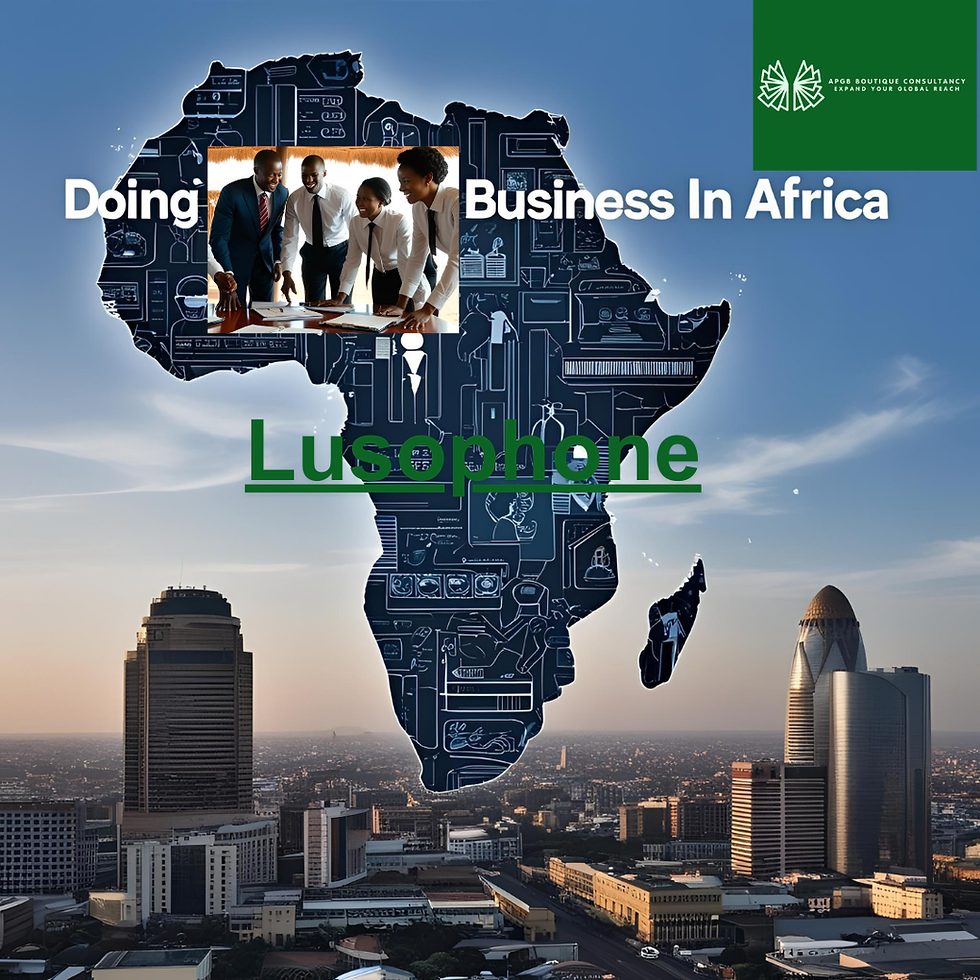Market Entry Myths in Lusophone Africa
- Alice Santos
- May 18, 2025
- 2 min read

Expanding into Lusophone Africa, home to vibrant economies like Angola, Mozambique, Cape Verde, Guinea-Bissau, and São Tomé & Príncipe, presents immense opportunity.
Yet, many companies hesitate or misstep due to persistent myths that cloud strategic judgment.
In this post, we debunk three common misconceptions that often derail market entry efforts, and we share key insights to help you navigate these dynamic markets successfully.
Myth 1: You Can Manage Market Entry Remotely
Reality: Success in Lusophone Africa demands a boots-on-the-ground approach.
Trying to manage your market entry from afar may save costs initially, but often results in misreading local dynamics, alienating key stakeholders, and missing out on high-impact opportunities.
Here’s why on-the-ground presence matters:
Local knowledge fuels accurate market insights, effective communication, and smooth navigation of logistics.
Cultural fluency helps companies adapt offerings and avoid reputational missteps.
Local partnerships provide access to decision-makers, informal networks, and regulatory clarity.
Setting up offices, hiring local talent, and engaging with the community not only builds trust but positions your brand as a long-term player essential for sustainable success.
Myth 2: It’s Too Politically Unstable to Invest
Reality: Political risk varies—many Lusophone African regions are stable and reform-oriented.
While risk assessment is essential, the assumption of blanket instability is outdated and inaccurate. Countries like Cape Verde consistently rank high on governance indicators, and Angola and Mozambique are actively improving their regulatory and business environments.
What smart companies do:
Conduct granular risk assessments by region and sector.
Engage with local legal and policy experts to understand reforms and incentives.
Focus on industries aligned with government priorities (e.g., renewable energy, infrastructure, agriculture).
The business landscape is evolving—and early movers are already capitalising on the shift toward stability and growth.
Myth 3: One Strategy Fits All Lusophone Countries
Reality: Lusophone Africa is diverse, and each country demands a tailored approach.
From Angola’s oil and logistics focus to Mozambique’s fast-growing energy and agri-business sectors, and Cape Verde’s tourism and services economy—every market has its own pulse.
One-size-fits-all strategies fail because they:
Overlook distinct consumer behaviors and regulatory structures.
Neglect regional supply chain and infrastructure differences.
Miss opportunities to customize branding and partnerships.
A winning strategy involves deep market research, localized branding, and product adaptation to meet the specific needs of each country’s economy and population.
Why Localized Expertise Matters
Entering Lusophone Africa isn’t just about investment—it’s about commitment to local relevance. That’s where localized expertise becomes your greatest asset:
✅ Cultural Competence: Language, etiquette, and trust-building can make or break a deal.
✅ Strategic Partnerships: Local alliances accelerate market penetration and reduce regulatory friction.
✅ Competitive Edge:Customized, informed strategies help you move faster and smarter than global competitors unfamiliar with the terrain.
Moving from Assumption to Action
At APGB Boutique Consultancy, we help businesses trade myths for insight, and hesitation for intelligent action. Whether you're eyeing Angola’s industrial zones or Cape Verde’s expanding services sector, we offer the local intelligence and strategic support to get you there successfully.
Don’t let myths guide your strategy. Let evidence and experience lead the way.


Comments